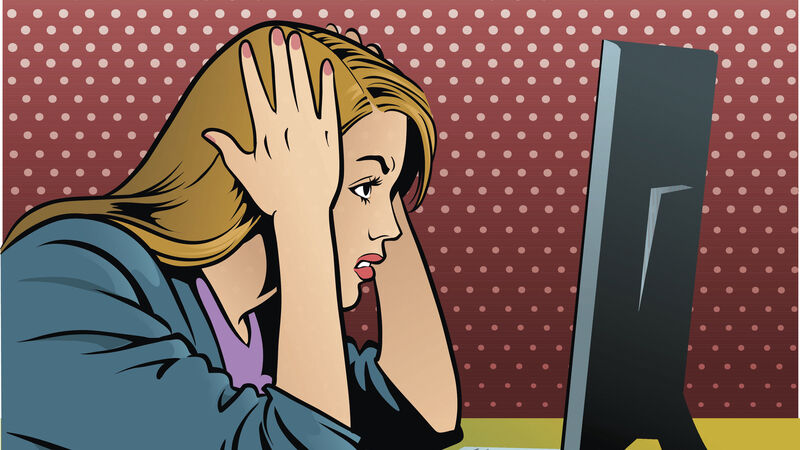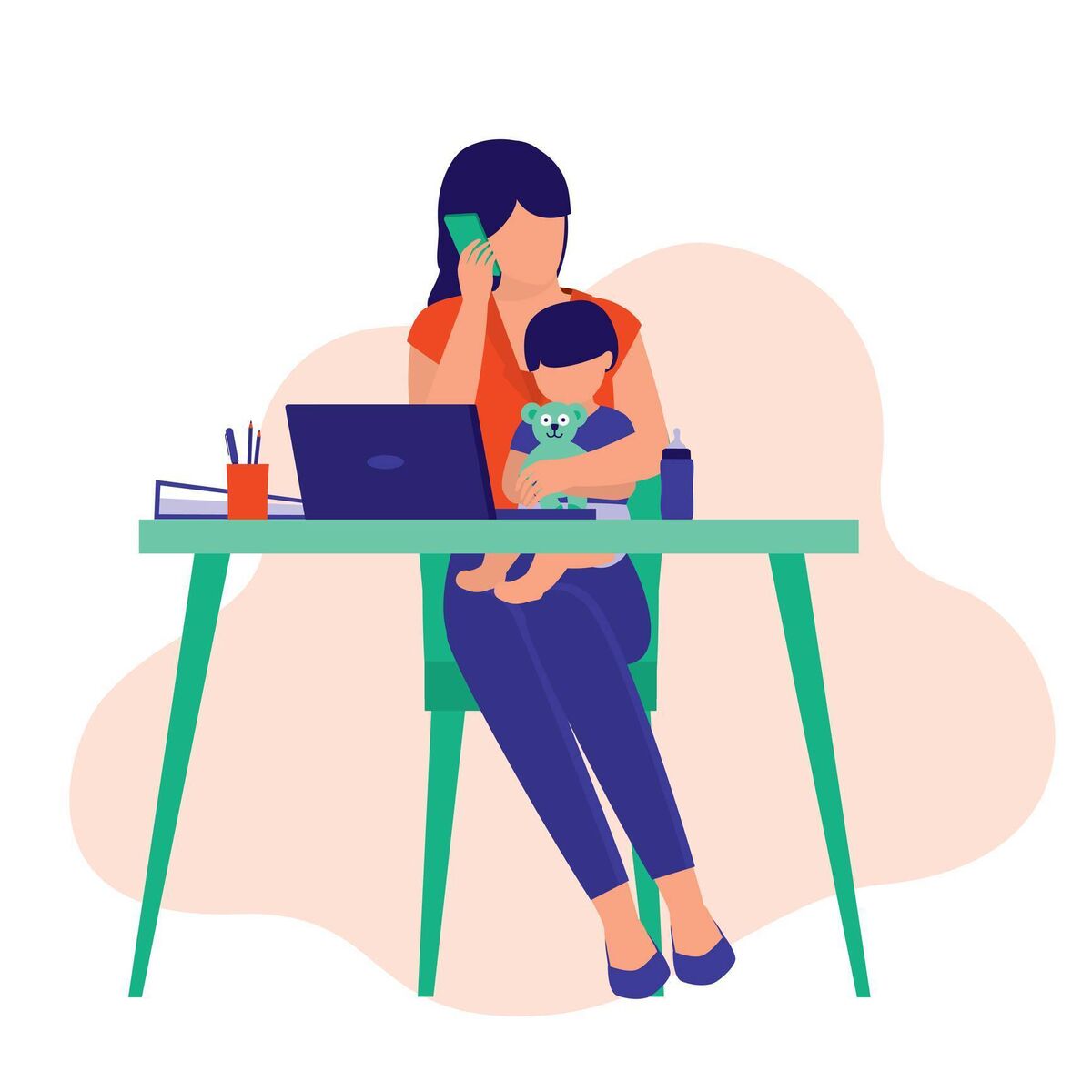The new workplace: readers share their best WFH stories

Over 95% of people want to continue working from home, according to an NUIG study.
Pretty much every aspect of normal life has changed since March 2020, but perhaps no area has been affected quite as much as the workplace.
“There’s a generational change happening in terms of organisational practice. This would normally take 20 or 30 years, but it happened in the space of months,” says Mark Doyle, chief executive of OMT Global, a consultancy firm specialising in leadership development. “People rallied around the emergency and came together and had the attitude of ‘we have to make this work’.”
And make it work we did. We took calls from cars, conducted interviews from childhood bedrooms, and held meetings with screaming babies on our hips. For many, working from home became living at work; for others, lunchtime made way for daily yoga practice and commutes were taken over by Strava and 5ks.
It didn’t come without some hiccups, of course. In a call-out, readers told us stories of cameras being accidentally left on in bathrooms and a manager’s wife not realising her husband was on Zoom when she waltzed in the door behind him, fresh out of the shower.
There was the lawyer who went to the mountains for a quiet space to work, only to have his caravan moved by sheep during a meeting. We heard of a teacher who had to tell one of her students to put his pet lamb away during class time and another whose student simply responded “I am in bed” when she asked him why he was absent that morning.
Of course, no one could forget ‘lawyer cat’, the viral video where a filter went wrong on a Zoom call in the US.

Here at the Irish Examiner, our editors have dealt with construction workers and roosters interrupting meetings, as well as one very unfortunate incident involving a sick cat, a laptop, and a traumatised IT worker who had the world’s worst cleaning job.
Our superhuman news editor is still sneaking around her house every day, trying to avoid her young children who have no idea she’s working from the attic. The editor of this fine magazine has had to work from her mobile phone on numerous occasions, thanks to a garden trimmers and some bad luck around her power lines.
Then there was poor Denise O’Donoghue, our reporter who, inspired by lockdown, taught herself to ride a bike for an article — only to sprain her wrist on camera.
New perks
Over the past year, we have laughed, we have cried, we have muted and we have quizzed, and, for countless workers out there, we now couldn’t imagine it any other way.
In fact, 95% of people want to keep working from home, according to an NUIG study.
“Nobody knows what it’s going to be like when the workplace reopens but the one thing you can be pretty sure of is that we can’t put the genie back in the bottle. I think everyone has been surprised that working from home has worked quite well for organisations that have been able to do it. I think if those organisations believe they can bring staff back to the workplace full-time, they’re going to struggle,” Mark Doyle says.
“They’re really trying to figure this out and they’re quite concerned about it. Some are concerned that there might be an exodus and the reality is nobody knows if that will happen.”
To try to combat this, some companies have been especially generous over the past year, sending out food kits, cocktail sets, and more to give staff a boost.
One of our readers listed gym equipment, paint and prosecco sets, Keep Cups, jackets, and a Pride package among the extra benefits his company offered last year. On top of all of that, he also received €1,000 in stipends for office equipment and was allowed to pick a gift from a selection that included wireless earphones, an Ipad, and a Flowstate yoga mat.
A Dublin software designer who spoke with us said that his company had been extremely thoughtful of staff this year; funding office equipment, setting up virtual wellness events, organising cooking classes, sending out Easter eggs, and giving staff every second Friday off for the summer for their hard work.
In the rebel county, DePuy Synthes sent out a hamper of local goodies to staff for Christmas in a box decorated with iconic Cork landmarks, with Stryker sending out similar presents. Things haven’t been too shabby here at the Irish Examiner either. Staff were sent a big box of treats for their work earlier this year, as well as access to virtual yoga classes, a cooking demonstration with Weekend columnists the Currabinny cooks at Christmas, and various other events.

“For our Christmas party we got cocktail kits sent out to us and we had a cocktail-making class and a virtual night at the races with Bingo Loco. For Shrove Tuesday we were all sent out everything we needed to make pancakes. For ‘national wellbeing in the workplace day’ they sent us all out scone mix, tea, coffee,” says Megan O’ Brien, who works with construction consultants Mitchell McDermott.
“Then for International Women’s Day, they sent everyone sweets, popcorn, and a list of movies where powerful women are the protagonists. We had a draw for the Euros as well where everyone got a team and whoever’s team won got a prize. We’ve also done some virtual outdoor activities to get us out of the house like Darkness Into Light, a Saint Patrick’s day walk, and a charity cycle.
“It’s been great for motivation because it’s very easy to feel detached from your fellow employees when you’re not sharing the same building. Despite starting with the company during lockdown and only having the opportunity to meet a small percentage of my fellow employees outside of Teams meetings, there’s a great sense of community and I feel very appreciated thanks to their efforts. It’s obvious that they place huge importance on their employees’ happiness and wellbeing.”
Mark Doyle says that for these reasons, offering perks such as extra days off and giving gifts is becoming more commonplace in big companies. “It certainly gives people a lift. Especially for staff who might be feeling a little bit removed from the business, as many are at the moment. They feel like the company is thinking about them. It just strengthens that connection point, even if it’s a temporary thing. Organisations are trying to send something to make people feel appreciated.
“In terms of it being a strategy to retain staff on its own, however, it certainly won’t work. People are exhausted.
"I see it myself. People have been working from home, some have been juggling young kids or caring for elderly parents, and those that aren’t might have to pick up extra work.
“It’s really important that organsiations keep focusing on staff. There was a lot happening last year with virtual parties and Zoom quizzes but we’re seeing far less of that now because people are tired of it. It’s more about making sure that staff really feel part of the team and that managers check in with each individual staff member.”
Checking in
Doyle also emphasises that checking in does not mean the same thing as checking up.
“Ask them what’s going on, make sure they feel included, give them a chance to talk. Some people have really loved working from home and some have not. A lot of organisations are doing surveys to get a sense of what their staff thinks, but ultimately, it comes down to the individual. Every individual has their own needs and requirements. I think the organisations that are going to be the most successful, are the ones that have the most flexible approach to that.”
Going forward, he doesn’t think that we’ll ever go back to working the way we did before, but as he points out, it’s up to the heads of the companies rather than individual opinions.
“There is no doubt that it won’t go back to the way it was prior to March last year. It’s all going to have to be figured out over the coming months and years.
"You have to remember that working from home was forced on people last year. That’s different to what we have ahead of us, where it will be up to the organisations to decide,” he says.
“There are decisions to be made and so many things to consider. For example, if you’ve got managers all going into the office and then some staff that aren’t, there could be a diversity issue. Maybe women might be more inclined to work from home because of childcare duties — if they’re absent will they be at a disadvantage in the future?
“Such decisions should be made collectively, rather than from top-down, which, unfortunately, many multinational companies based in Ireland have to deal with.
“I don’t think it’s the right approach to think staff will live with a decision they’re not happy with. This is a new way of working into the future and flexibility is going to be required if you want to attract and retain the best people. It won’t be a case of going back to normal. It will be a new workplace.”
CONNECT WITH US TODAY
Be the first to know the latest news and updates







